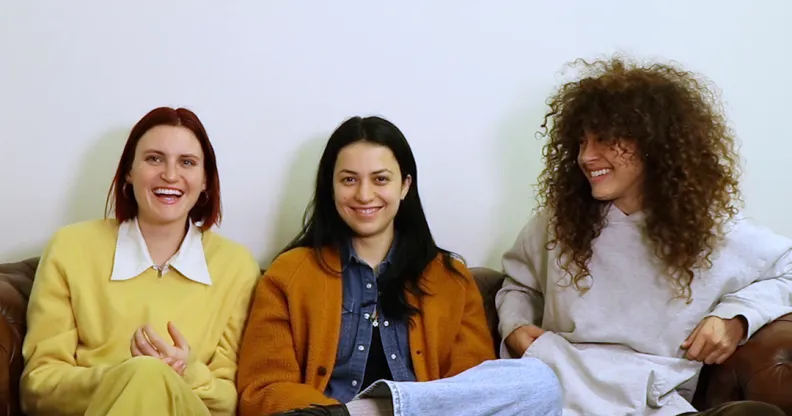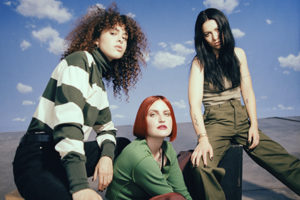Queer band Muna on coming out, dealing with shame and, of course, saving the world

When Muna members Katie Gavin, Josette Maskin and Naomi McPherson first started as a band in 2014, they deliberated about whether they wanted to be an ‘out’ band or not.
Maskin admits that she and McPherson struggled with the thought more than Gavin, who ultimately pushed them to be open.
Reflecting back on the decision, Maskin admitted that it might have been the best thing they’ve ever chosen to do – and their dedicated queer fanbase might agree.
To Gavin, describing themselves as a queer band made sense for the music they were making.
“We’re asking questions about love and power, and [with] the way that we approach songwriting, I would say this kind of fits into what I think of as queer culture.”
It’s been more than 20 years since Ellen DeGeneres’ groundbreaking televised coming out scene, and queer culture has continued to thrive since then.
In 2020, being queer is not always the defining characteristic of a person, and for some, coming out doesn’t mark the end of their career like it used to.
But being out in an industry where many people choose to hide their sexuality can come with a lot of pressure to act or be a certain way.
And coming out publicly can still be a struggle, no matter how comfortable you are with your sexuality.
Maskin notes that, for a lot of people, coming out involves unpacking society’s idea of who you are – and being out in the public eye can make it more difficult to do so.
“I do think it’s hard to come to terms with who you are and also to deal with a lot of shame and pressure that society puts on you,” she says.
Even after LGBT+ people began to take up space in the media, representation was sparse and fraught with problems.
Growing up, Maskin found it hard “to find a lot of queer representatives in pop culture, even though there were definitely some major ones”.
But McPherson points out that “we’re in a different phase now, it feels like, culturally”.
“It does feel like it’s an advantage to be queer in certain ways,” she continues. “There are people who are grateful for the fact that you are out.”
A big part of what connects Muna’s fans to their music is how honest it is – and they all agree that they wouldn’t be able to be honest if they weren’t out.
“I think we would be a different band if we weren’t out,” says Makin. “Based on the fact we wouldn’t be honest with who we were. I think so much of our queer brand is to be honest and to be just exactly who we are.”

(RCA Records Label)
Muna have a reputation for bringing together the friendliest crowds, and have created safe spaces at their concerts by advocating for gender-neutral toilets.
When speaking about their lyrics, McPherson says: “There is definitely a vulnerability to the lyrics that leads our audience to a very intimate space with us.
“We are sharing something intimate with them.”
One of Muna’s biggest hits, ‘I Know a Place’, sets a precedent for what the band is about and what to expect from a Muna gig. “Weeping, crying and hugs and comfort from strangers,” McPherson explains.
For the LGBT+ community, queer culture has always provided a place where you can feel like you are part of something bigger – which is what Muna’s music does so well.
For those who feel like they are isolated or lack representation, Muna can fill that gap.
Their music becomes a comfort and for many, their concerts feel like home.
“We are putting the music out to show people that they are not alone. I think it’s a place of communion and catharsis.”
When asked what’s next for Muna, Maskin says: “I just really want to figure out how to take a bigger seat into myself as a person. I feel like we’re all just trying to La-Z-Boy into our personalities and lives.”
Whatever they have planned for the future, at least they can tick off saving the world.
Muna’s second album Saves the World is out now.

